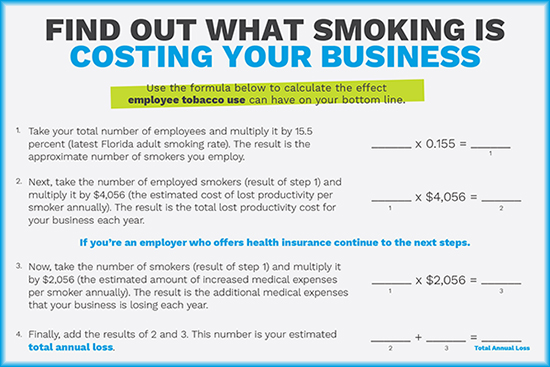News and Events
Helping Employees Quit Tobacco
By Leslie Spurlock
November 15, 2018
Employees are a valuable resource in every business. Although fewer people today are smoking, employees who smoke or vape* during work hours can cost employers $4,056 in lost productivity annually. This is a result of frequent smoke breaks, increased number of sick days, and distraction. Health care costs can increase by as much as $2,056 per smoking employee for a total of $6,112. A hidden cost is low morale among non-smokers who are likely being asked to cover for the co-worker who is outside smoking. Could this be your worksite?

Smoking is an addiction, not a habit. So how do employers help employees quit tobacco? Number one; employees are never asked to quit. Environment and a culture of support for wellness creates a climate of change for smokers. This is easily accomplished with a Tobacco Free Policy. Every business has a set of rules for employees regardless of industry. Every set of rules should include a policy addressing tobacco use while on duty or on property.
Developing a Tobacco Control Policy is a legal and moral responsibility. The Florida Clean Indoor Act (Florida Statute 386.201 – 386.2125) bans smoking in an enclosed indoor work place. A key requirement is for the person in charge of an enclosed indoor workplace to develop and implement a policy regarding smoking prohibitions. A well written policy protects non-smokers and offers smokers support via continuous cessation opportunities. The policy sets the expectation, promotes wellness, communicates cessation opportunities, and is equitable for all employees.
How do employers write a policy? Each policy should begin with a statement of purpose or rationale explaining the goal of the policy. Who does the policy apply to? Employees? Or everyone who comes on the property? What areas of the property are covered by the policy? Are vehicles covered? What are the rules? Are there designated smoking areas? How many breaks are allowed for all employees? What terms are defined? Will today’s definitions cover tomorrow’s new tobacco product? What is the date of implementation? How is the policy enforced and by whom?
Businesses and nonprofit agencies in Indian River County have consulted with QuitDoc Foundation’s Tobacco Prevention Specialist to refine their tobacco control policies and increase cessation opportunities for employees. Among them were Piper Aircraft, Indian River Medical Center, the School District of Indian River County, Senior Resource Association, Wild Thyme Catering, Healthy Families IR, and Indian River County government.
What do they say about tobacco control policies? Indian River Medical Center thought there would be tremendous push back from smokers when they became a 100% Tobacco Free Campus, however there were no repercussions. Piper revised their 100% Tobacco Free Grounds policy to create designated smoking areas for the safety of smokers. Indian River County Government included all vehicles in their Tobacco Free Employee policy. The School District of Indian River County has 100% Tobacco Free Grounds. They also increased cessation benefits via employee health insurance which earned them a Silver Award from the Florida Tobacco Cessation Alliance. All these businesses participate in Great American Smokeout activities annually to emphasize their commitment to helping employees who want to quit.
Initiating a Tobacco Control Policy is not punitive. In fact, it treats all employees impartially. It is good business. A Tobacco Control policy is an important step towards a healthy lifestyle for all while supporting valuable resources and maintaining the health of business.
For more information on developing a tobacco free workplace policy, contact Indian River Tobacco Prevention Specialist, Leslie Spurlock at Lspurlock@quitdoc.com; 772-577-3701. Click www.tfp-indianriver.org and visit us on Facebook.
____________________________________________________________________
*Florida’s Amendment 9 to the Constitution banning vaping where smoking is banned passed and will go into effect no later than July 1, 2019. For purposes of this article the term ‘smoking’ shall also mean ‘vaping’ or using electronic nicotine dispensing systems.




